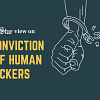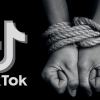Human Trafficking Cases: Conviction rate keeps falling
Prosecutions over human trafficking related cases in the country have been reducing each year and came down alarmingly last year mainly because of faulty case filings, inappropriate victim identification and lack of allegations raised by victims.
The authorities prosecuted 302 alleged traffickers in 2016, compared to 481 in 2015. Only three traffickers were convicted in 2016, down from four in 2015 and 15 in 2014, according to a US State Department report.
On many occasions, either the cases were withdrawn or both parties settled the matter out of court to avoid lengthy proceedings, obstacles arising from appearing before distant court, inability to bear expenses and lack of security for victims and witnesses.
These findings were shared yesterday in the capital during a series of events organised by 17 organisations and educational institutions, working for ensuring migrant rights, marking the World Day against Trafficking in Persons says a press release.
The organisers called for proper implementation of relevant laws, rules and the national plan of action to eliminate human trafficking from the country.
The 17 organisations and institutions are: BRAC, INCIDIN Bangladesh, Centre for Women and Children Studies, Bangladesh National Woman Lawyers' Association, Bangladesh Society for the Enforcement of Human Rights, Obhibashi Kormi Unnayan Programme, WARBE Development Foundation, Anirban Survivor Voice, United Nations High Commissioner for Refugees (UNHCR), USAID Bangladesh, Winrock International, Solidarity Centre Bangladesh, Justice and Care, TDS-Netherland, Witness, PCTNCN, ATSEC Bangladesh and Dhaka University.
The programmes included three panel discussions at Dhaka University's Faculty of Law and Institute of Disaster Management and Vulnerability Studies and in Police Staff College in Mirpur and a meet the press event at the Jatiya Press Club.
National Human Rights Commission expressed solidarity with the initiative.
According to this year's US State Department report, which placed Bangladesh on the “tier 2 watch list”, the government investigated 122 sex and 168 labour trafficking cases last year, a decrease from 181 sex and 265 labour trafficking cases a year ago.
“Tier 2 watch list” is a step down from tier 2 where the country saw itself for five years since 2012.
Praising the initiative for upholding migrant workers' rights, NHRC Chairman Kazi Reazul Hoque said at the press club event that migrant workers are the lifeline in terms of boosting the country's foreign reserves through earning remittance in exchange for their labour.
“But it should not be at the cost of their human rights,” he said.
He added that the government must ensure migrant workers' due rights by eliminating human trafficking rackets. For this, the government has to nab the trafficking ring leaders and unscrupulous recruiting agency members.
At the event, INCIDIN Bangladesh Executive Director AKM Masud Ali said the long length of proceedings will not be resolved if a separate tribunal is not formed for quick disposal of the cases.
The amount of time consumed is a bar to proper implementation of the law and will create distrust in aspirant migrants, he said.
He further said the government needs to ensure safe migration even for less skilled workers.
Referring to a police headquarters' statistics, the organisers said that some 3,500 cases were filed across the country since formulation of the Prevention and Suppression of Human Trafficking Act, 2012.
In the last five years, as many as 2,733 people have been rescued from the clutches of human traffickers in Cox's Bazar with 242 cases filed against some 1,355 people over the incidents.
However, not a single case has been disposed of.
According to the “Global Report on Trafficking in Persons, 2016” prepared by the United Nations Office on Drugs and Crime, Bangladesh reported just 10 to 15 convictions a year in human trafficking cases. This was markedly below the conviction rate (50 to 80) in neighbouring Nepal.

 For all latest news, follow The Daily Star's Google News channel.
For all latest news, follow The Daily Star's Google News channel. 








Comments